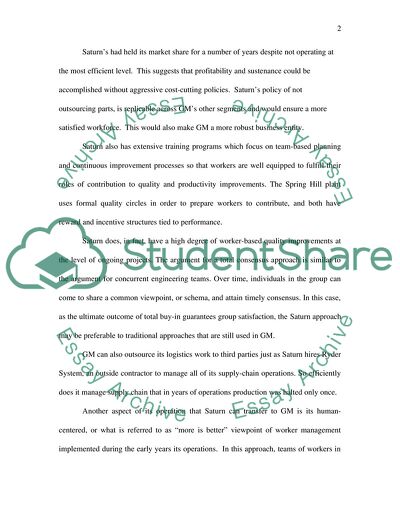
- Home
- Free Samples
- Premium Essays
- Editing Services
- Extra Tools
- Essay Writing Help
- About Us
- Studentshare
- Subjects
- Miscellaneous
- Marketing- Saturn Corporation in 1998
Marketing- Saturn Corporation in 1998 - Essay Example
Saturn’s Spring…

- Subject: Miscellaneous
- Type: Essay
- Level: Undergraduate
- Pages: 4 (1000 words)
- Downloads: 0
- Author: ullrichardith
Extract of sample "Marketing- Saturn Corporation in 1998"
The employees were also fairly rewarded for their part in Saturn’s success. These practices could easily be implemented in other divisions as well and recommended too. Saturn had established a strong quality standard in its engines, transmissions, metal stampings, moldings, polymer door panes, and passenger-cockpits. In this respect, application of Saturn’s quality standards across all GM operations is both feasible and appropriate. Saturn’s had held its market share for a number of years despite not operating at the most efficient level.
This suggests that profitability and sustenance could be accomplished without aggressive cost-cutting policies. Saturn’s policy of not outsourcing parts, is replicable across GM’s other segments and would ensure a more satisfied workforce. This would also make GM a more robust business entity. Saturn also has extensive training programs which focus on team-based planning and continuous improvement processes so that workers are well equipped to fulfill their roles of contribution to quality and productivity improvements.
The Spring Hill plant uses formal quality circles in order to prepare workers to contribute, and both have reward and incentive structures tied to performance. Saturn does, in fact, have a high degree of worker-based quality improvements at the level of ongoing projects. The argument for a total consensus approach is similar to the argument for concurrent engineering teams. Over time, individuals in the group can come to share a common viewpoint, or schema, and attain timely consensus. In this case, as the ultimate outcome of total buy-in guarantees group satisfaction, the Saturn approach may be preferable to traditional approaches that are still used in GM.
GM can also outsource its logistics work to third parties just as Saturn hires Ryder System, an outside contractor to manage all of its supply-chain operations. So efficiently does
...Download file to see next pages Read More
- TERMS & CONDITIONS
- PRIVACY POLICY
- COOKIES POLICY